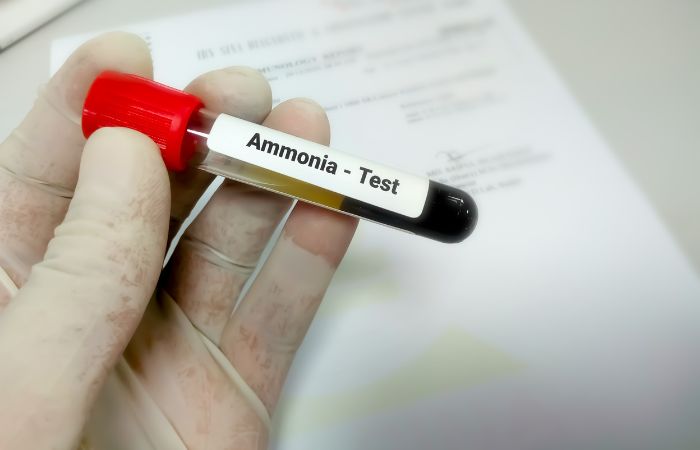
Ammonia is a toxic compound that is produced naturally when your body breaks down proteins. Normally, the liver processes this ammonia and converts it into urea, which is then excreted by the kidneys through urine. However, when the liver or kidneys are not functioning properly, ammonia can build up in the bloodstream, leading to serious health issues. An ammonia test helps measure the level of ammonia in your blood, which can help doctors diagnose and monitor liver and kidney function.
An ammonia test measures the level of ammonia in your blood. Elevated ammonia levels can indicate various health problems, such as liver disease (e.g., cirrhosis or hepatitis), kidney problems, or metabolic disorders. In more severe cases, high ammonia levels can lead to hepatic encephalopathy, a condition that affects brain function and can cause confusion, drowsiness, and even coma. The ammonia test is a blood test, and the results can provide critical information to your doctor regarding your liver, kidney, or metabolic function. It’s particularly useful in patients with symptoms of liver disease or kidney dysfunction, and those in critical care units (ICU).
There are several conditions and scenarios in which an ammonia test may be necessary:
1] Liver Disease: Ammonia builds up in the bloodstream when the liver is not functioning properly. Conditions such as cirrhosis, hepatitis, or liver failure can cause elevated ammonia levels.
2] Hepatic Encephalopathy: This is a serious condition caused by liver disease where toxins like ammonia build up in the bloodstream and affect brain function.
3] Kidney Disease: Kidney dysfunction can impair the body's ability to filter out ammonia, leading to high levels in the blood.
4] Metabolic Disorders: Certain inherited or acquired metabolic disorders can interfere with ammonia metabolism, leading to elevated blood levels.
5] Monitoring Critical Patients: Ammonia tests are often used to monitor patients in the ICU or those undergoing critical care.

Proper preparation ensures the most accurate results possible from your ammonia test. While the process may vary slightly depending on the laboratory or healthcare provider, the following guidelines should be applicable in most cases.
1] Fasting Before the Test :
In most cases, you will need to fast before the ammonia test. Fasting helps ensure that the test results are not affected by the food in your stomach, particularly proteins. This is because the digestion and breakdown of protein can produce ammonia, and fasting prevents this process from interfering with the test.
A] Fasting Duration: Typically, you will be asked to fast for 8 to 12 hours before the test. This means you should refrain from eating any food or drinking anything except for water during this period.
B] Water Intake: Most healthcare providers allow water during fasting, so it’s important to stay hydrated, but avoid excessive consumption of liquids, as it could interfere with your results.
If you are unsure about whether to fast or how long to fast, consult with your healthcare provider for specific instructions.
2] Notify Your Healthcare Provider About Medications :
Certain medications can interfere with ammonia test results. It’s important to tell your doctor about any prescription or over-the-counter medications, supplements, or herbal treatments you are taking. Some medications that may affect ammonia levels include:
A] Diuretics (used for fluid retention and high blood pressure)
B] Lactulose (a medication that can reduce ammonia levels in the body)
C] Antibiotics (which may affect gut bacteria that process ammonia)
D] Other medications such as those used to treat epilepsy or other conditions
Your healthcare provider may advise you to temporarily stop taking certain medications before the test, or they may adjust your treatment to account for these medications.
3] Avoid Alcohol Consumption : Alcohol can significantly impact liver function and ammonia metabolism, so it is important to avoid consuming alcohol for at least 24 hours before the ammonia test. If you are a heavy drinker, it’s best to inform your doctor, as alcohol consumption can exacerbate liver problems and may lead to falsely elevated ammonia levels.
4] Ensure Proper Hydration : Although you may be asked to fast before your test, proper hydration is essential. Dehydration can impact test results, so it’s important to drink an appropriate amount of water prior to the test. However, avoid excessive drinking right before the test, as overhydration may dilute the ammonia in your bloodstream, potentially skewing the results. Moderation is key.
5] Avoid Intense Physical Activity : Before the ammonia test, it’s best to refrain from engaging in strenuous physical activity. Intense exercise can affect the levels of ammonia in the blood, so if possible, try to avoid exercise for at least 24 hours before the test.
6] Time of the Test : Ammonia tests are typically performed in the morning, especially if fasting is required. Testing in the morning helps ensure that the fasting period is appropriately followed. Be sure to confirm the exact time of your test with your healthcare provider or the clinic where you are having the test.
7] Inform Your Doctor About Symptoms and Medical History :
Before undergoing the ammonia test, your healthcare provider will likely ask about your medical history, including any current symptoms or health conditions you are experiencing. Be sure to provide accurate and detailed information about your health, including any:
A] Symptoms of liver disease: Jaundice, abdominal pain, or swelling
B] Kidney disease symptoms: Changes in urination or fluid retention
C] Neurological symptoms: Confusion, lethargy, or personality changes, especially if you are suspected of having hepatic encephalopathy.
This information will help your doctor better interpret your ammonia test results and make a diagnosis.
The ammonia test is a simple blood test that involves the following steps:
1] Arrival at the Lab/Clinic: Upon arrival, you will be asked to wait in a designated area until it is time for your blood draw.
2] Blood Draw: A healthcare provider will insert a needle into a vein in your arm to collect the blood sample. The procedure should take only a few minutes.
3] Post-Test Care: After the blood is drawn, you may be asked to remain seated for a few minutes to ensure there are no immediate issues like fainting or dizziness.
4] Sample Analysis: Your blood sample will be sent to a laboratory, where it will be analyzed to determine the concentration of ammonia in your blood.
In most cases, the test itself is quick and painless. Some patients may experience mild discomfort or bruising at the needle insertion site, but this is temporary and usually resolves quickly.
The ammonia test measures the level of ammonia in the blood in micromoles per liter (µmol/L). The normal ammonia range is generally between 15 and 45 µmol/L, but this can vary slightly depending on the laboratory and the specific test methods used.
Elevated ammonia levels may indicate liver dysfunction, kidney problems, or a metabolic disorder. Depending on the severity of the elevation, your doctor may order additional tests or imaging to investigate further.
A] Liver Disease: Cirrhosis, hepatitis, or liver failure.
B] Hepatic Encephalopathy: A condition caused by liver disease leading to toxin buildup in the bloodstream, affecting brain function.
C] Kidney Disease: Impaired kidney function can prevent the body from eliminating ammonia properly.
D] Metabolic Disorders: Certain genetic conditions may affect how the body processes ammonia.
If you are located in any of these cities Pune, Mumbai, Delhi, and Nagpur and need further assistance with your ammonia test, consider reaching out to Diagnopein. The healthcare professionals at our centers are ready to provide you with the necessary information and guidance for this important diagnostic procedure.
By taking the proper steps to prepare for the ammonia test, you can ensure that the results are reliable and provide critical information for your healthcare provider to make the best decisions for your health.


